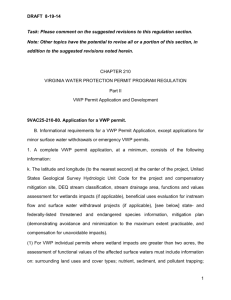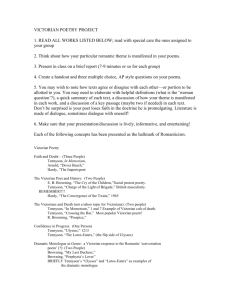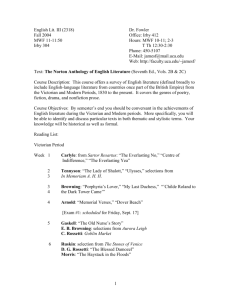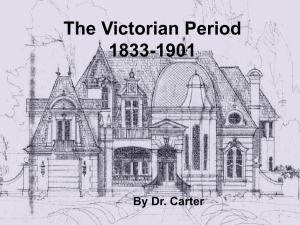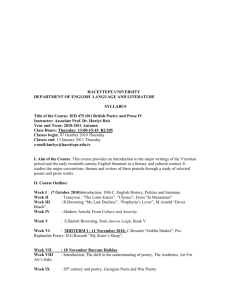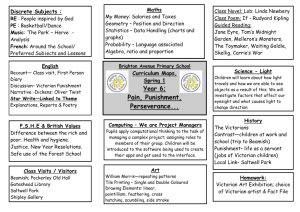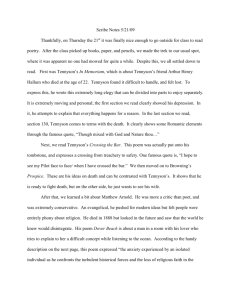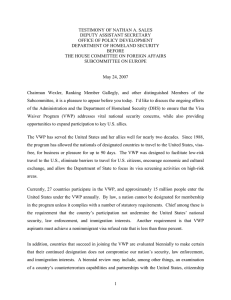course description - British Victorian Literature 2014
advertisement
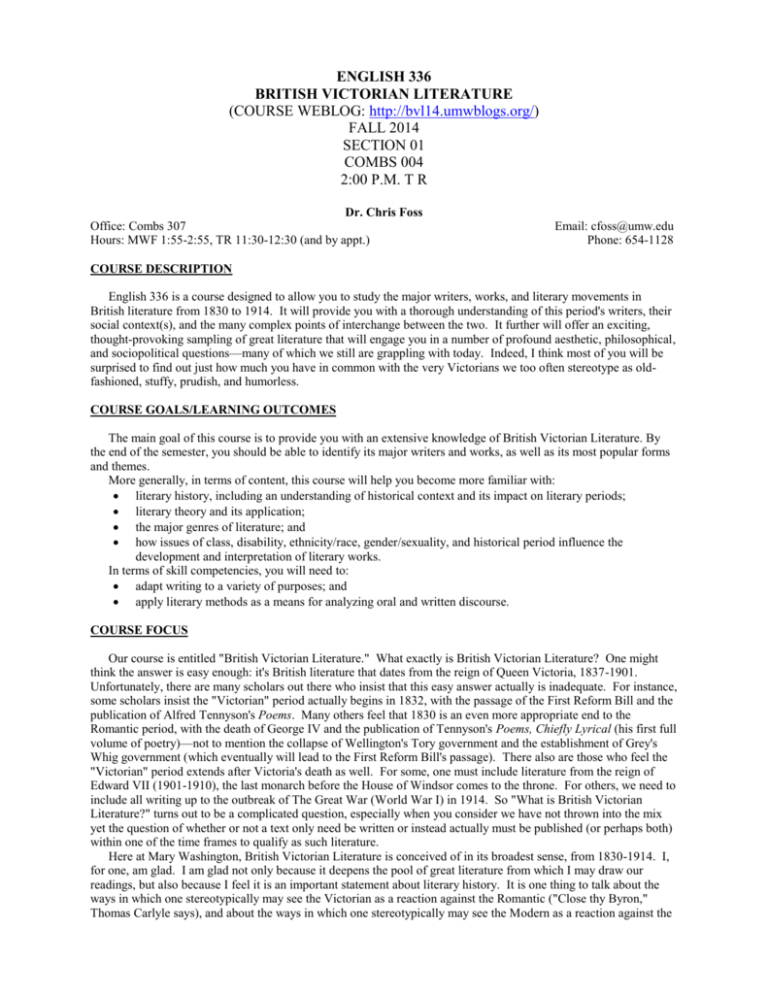
ENGLISH 336
BRITISH VICTORIAN LITERATURE
(COURSE WEBLOG: http://bvl14.umwblogs.org/)
FALL 2014
SECTION 01
COMBS 004
2:00 P.M. T R
Dr. Chris Foss
Office: Combs 307
Hours: MWF 1:55-2:55, TR 11:30-12:30 (and by appt.)
Email: cfoss@umw.edu
Phone: 654-1128
COURSE DESCRIPTION
English 336 is a course designed to allow you to study the major writers, works, and literary movements in
British literature from 1830 to 1914. It will provide you with a thorough understanding of this period's writers, their
social context(s), and the many complex points of interchange between the two. It further will offer an exciting,
thought-provoking sampling of great literature that will engage you in a number of profound aesthetic, philosophical,
and sociopolitical questions—many of which we still are grappling with today. Indeed, I think most of you will be
surprised to find out just how much you have in common with the very Victorians we too often stereotype as oldfashioned, stuffy, prudish, and humorless.
COURSE GOALS/LEARNING OUTCOMES
The main goal of this course is to provide you with an extensive knowledge of British Victorian Literature. By
the end of the semester, you should be able to identify its major writers and works, as well as its most popular forms
and themes.
More generally, in terms of content, this course will help you become more familiar with:
literary history, including an understanding of historical context and its impact on literary periods;
literary theory and its application;
the major genres of literature; and
how issues of class, disability, ethnicity/race, gender/sexuality, and historical period influence the
development and interpretation of literary works.
In terms of skill competencies, you will need to:
adapt writing to a variety of purposes; and
apply literary methods as a means for analyzing oral and written discourse.
COURSE FOCUS
Our course is entitled "British Victorian Literature." What exactly is British Victorian Literature? One might
think the answer is easy enough: it's British literature that dates from the reign of Queen Victoria, 1837-1901.
Unfortunately, there are many scholars out there who insist that this easy answer actually is inadequate. For instance,
some scholars insist the "Victorian" period actually begins in 1832, with the passage of the First Reform Bill and the
publication of Alfred Tennyson's Poems. Many others feel that 1830 is an even more appropriate end to the
Romantic period, with the death of George IV and the publication of Tennyson's Poems, Chiefly Lyrical (his first full
volume of poetry)—not to mention the collapse of Wellington's Tory government and the establishment of Grey's
Whig government (which eventually will lead to the First Reform Bill's passage). There also are those who feel the
"Victorian" period extends after Victoria's death as well. For some, one must include literature from the reign of
Edward VII (1901-1910), the last monarch before the House of Windsor comes to the throne. For others, we need to
include all writing up to the outbreak of The Great War (World War I) in 1914. So "What is British Victorian
Literature?" turns out to be a complicated question, especially when you consider we have not thrown into the mix
yet the question of whether or not a text only need be written or instead actually must be published (or perhaps both)
within one of the time frames to qualify as such literature.
Here at Mary Washington, British Victorian Literature is conceived of in its broadest sense, from 1830-1914. I,
for one, am glad. I am glad not only because it deepens the pool of great literature from which I may draw our
readings, but also because I feel it is an important statement about literary history. It is one thing to talk about the
ways in which one stereotypically may see the Victorian as a reaction against the Romantic ("Close thy Byron,"
Thomas Carlyle says), and about the ways in which one stereotypically may see the Modern as a reaction against the
Victorian ("Make It New," Ezra Pound says). It is another to realize that Tennyson's early work was panned for
being too Keatsian. Or to recall that William Wordsworth is Poet Laureate from 1843 until his death in 1850, when
Tennyson succeeds him (in a year that sees the first publication of each writer’s masterwork, The Prelude and In
Memoriam respectively). It is another to realize that the Modernist avant-garde does not spontaneously materialize
out of thin air but in fact is following in the footsteps of the avant-garde Aesthetes and Decadents from the 1890s.
Or to recall that major Modern figures like Joseph Conrad, Thomas Hardy, George Bernard Shaw, and William
Butler Yeats all were publishing in the Nineties, if not before. While we will not necessarily be engaging with this
issue on a daily basis, I am nonetheless pleased with our conception of British Victorian Literature in that it helps
foster a healthy awareness of the complexities of literary history.
I have divided our calendar of readings into three main units representing the Early, Middle, and Late phases of
the period, and each unit is cleverly titled in honor of a great Victorian novel from that phase (by Charles Dickens,
George Eliot, and Hardy respectively). Within each of these units, the readings will revolve around four topical
focus points: (1) Religion and Science, (2) Victorian Ladies and Gentlemen, (3) Travel and Empire, and (4)
Aestheticism. I have grouped the majority of your readings thematically (rather than simply proceeding from one
author to the next in typical anthology fashion) to allow for a better sense of chronological progression through the
three distinct, if also somewhat overlapping, phases. Consequently, you will read (for example) eight different
Tennyson texts spread across all three phases and distributed under three of the four main topical focus points rather
than reading all of them on the same day or two near the beginning of the course. Each unit will begin with a day on
a notable single author from the phase in question (Dickens, Christina Rossetti, and Robert Louis Stevenson
respectively) before turning to the topical focus points, and each will end with the intensive multi-day study of
another notable writer from said phase (Charlotte Brontë, Toru Dutt, and Oscar Wilde respectively). Along the way
you will hear from 39 different voices--including 21 women, as well as some writers of color. In this way we will
hope to plumb the astonishing variety and complexity of the many voices present in the period.
What hopefully will be most exciting for you, however, is that ultimately in this course you will not simply be
subjected to my idea of what texts you should read in order to best approach our overarching question. One of your
major assignments, the Channel Firing essay, will allow each and every one of you to join in the process of canon
formation by making an argument for works I did not assign to be included on my next syllabus. To stress our true
partnership in this enterprise, I want you to know that I have added 25 new now-official professor-assigned readings
to your calendar, all of which were Channel Firing selections by students in the previous iteration of this course (in
Spring 2013). I hope knowing that students taking this course in the future will be reading something you have
nominated for inclusion in my own BVL canon will motivate you to fully embrace this project. In this way I hope to
foster in you a true sense of ownership where the course material is concerned and to emphasize that you are
participating in a dynamic process of meaning-making as we explore our subject matter together.
COURSE FORMAT
For me, education should be all about process. Yes, you’ll need me to supply you with a fair amount of contentbased information. At the same time, I never want my classroom to be a place where you come to receive passive
information transmissions. It is what you do with such information—your process of actively engaging with the
material—that is most important. Discussion, rather than lecture, is my primary method of delivery, precisely
because I see it as the best means of fostering an environment in which process and multiplicity are encouraged (as
well as an excellent means of honing one’s ability to think critically and to express oneself clearly and accurately).
I will offer you a variety of discussion-based formats: instructor-led large group discussions, student-led small
group discussions, and electronic discussion forums. If any of this discussion is to be successful, you must believe
that I value your personal opinions and that I value discussion which does not seek to close itself off by deducing or
producing the correct answer. You must come to see that there are very few easy answers and that working to
complicate rather than complete questions often times is more intellectually satisfying, if also more challenging. You
must be free to disagree and comfortable enough to chance a potentially off-the-wall idea, even if you end up feeling
a little foolish about it later; otherwise, as a class we may lose too many opportunities to move beyond answers one
may simply memorize to a more complex consideration of multiple possibilities. You must be willing to explore
questions without any pressure to decide upon final answers until later—sometimes as late as the final examination,
or even beyond the end of the course.
Class time will revolve around the three inextricably interrelated activities of reading, speaking, and writing as
the means for providing you both with a thorough knowledge of British Victorian Literature. Your homework and
your in-class activities accordingly are geared toward providing you with a working knowledge both of basic
methods for close reading of primary texts and of strategies for both speaking and writing about these texts. Whether
our focus at any given time is reading, speaking, or writing (or some combination thereof), you will need to move
away from the idea of the classroom as a place you go to be lectured at by a teacher. Instead, you must think of this
classroom as more along the lines of a think tank where we all come to share your own ideas, to listen to others’
ideas, and to reflect critically on all of these ideas together.
COURSE ASSIGNMENTS
You will pursue these goals through oral and written contributions to the class. Your oral contributions first and
foremost involve your participation in class discussions (see Class Participation below). Your written contributions
will take the form of both graded and nongraded assignments. You will write three graded papers for me. Two will
be formal, thesis-driven blog posts that interpret a key passage from one of our readings (see separate assignment
sheet); the third will be the Channel Firing essay mentioned above in the Course Focus section (see separate
assignment sheet also). Last but not least, you will be writing an in-class final examination.
Nongraded writing assignments for class meetings will serve as a springboard for discussion and/or an exercise in
honing your critical writing skills, and they will earn you points toward your class participation grade. You also may
contribute some nongraded electronic writing as further class participation (see below) on our course blog.
CLASS PARTICIPATION AND REWARD QUIZZES
Your active class participation is required. The points for this portion of your grade primarily will come from
oral contributions to in-class discussions (both in small-group and in large-group formats), plus any in-class or forclass informal writing assigned. Our discussions will ask you to practice close reading of the assigned texts.
Accordingly, you need to take these discussions seriously by coming prepared to talk about what you have
read/watched. For those of you who wish to pad your oral class participation with extra-credit points, you may post
comments and/or upload content to our course blog as an electronic supplement to our in-class work.
I invite you all to bring your laptops, phones, etc. to class in order to take advantage of what they have to offer
your learning experience, but please do not abuse this invitation by texting, checking email or Facebook, etc. I
consider such activities the contemporary equivalent of reading a newspaper in class. I’m happy for you to have
your phones on (if muted) so that you may be reached in case of emergency, but nonemergency messaging or
browsing should not be taking place; it is not only distracting to me (and, likely, to at least some of your peers), but
it is disrespectful. If you need to engage in such activity, please leave the room before doing so. If you abuse this
privilege, I will (after a warning, of course) require you to leave all such devices at home for the rest of the semester.
What is more, you may expect any issues/problems along these lines (as with any other disruptive/disrespectful
activity) to negatively impact your class participation grade.
Finally, I also will be giving frequent unannounced quizzes (with no make-ups) as part of a separate quiz grade.
Your points from these factual, content-based quizzes will be totaled and curved at the end of the semester.
COURSE GRADING
The distribution that will determine your final grade is as follows:
Quizzes
15%
Class participation
25%
Formal blog post #1
10%
Formal blog post #2
10%
Channel Firing paper
20%
Final examination
20%
In all this work you will be expected to abide by Mary Washington's Honor Code and thus to refrain from lying,
cheating, and stealing in all their various and nefarious forms. You must complete all three papers and the final
examination in order to receive a passing grade for this course.
COURSE TEXTBOOKS
There will be three main texts for this course. They are:
•
The Longman Anthology of British Literature, Volume 2B (The Victorian Age), 4TH EDITION
•
Victorian Women Poets: A New Annotated Anthology--Blain, ed. (Longman)
•
Jane Eyre—C. Brontë (Penguin Classics)
There also will be some supplementary readings provided electronically. By registering for this course you
agree to read/use the editions selected by yours truly; this means you need to purchase and use all of these
texts, even if you already own a different version of some of them.
You should have your own copy of the necessary text(s) at hand for each meeting; this means, for the texts you
access online you either need to print out a personal copy or bring a laptop or other device that will allow you to find
and read specific passages during our discussion time (or in case I assign an in-class writing exercise on a specific
passage). Where the books are concerned, I am aware that, increasingly, students like to utilize electronic options
such as Kindle. I am not going to forbid any of you from doing so (or from securing cheaper but different editions of
the books from elsewhere rather than from our campus bookstore), but there are a couple of caveats you need to
know ahead of time.
First of all, I cannot promise that I or the rest of the class always will be able to help you find your way to any
particular passage under discussion. As noted above, if things go according to plan, we will spend a fair amount of
time turning to specific pages and performing a close reading of individual sentences/paragraphs; thus, it is important
for as many of us as possible literally to be on the same page—and, if you are unable to follow along with us, it
makes it more difficult for you to participate as actively or fully.
Second, I will not grade any formal written work that does not use the pagination I have at hand in the instructoradopted texts. I do not mean to appear unaccommodating in insisting on such a policy, but when I am grading your
written work I want to be able to review any specific passages/sections you refer to with as little difficulty as possible
so that I avoid wasting time that might otherwise be better spent formulating and writing responses to your essays.
DISABILITY ACCOMMODATIONS
I will make every effort to accommodate disabilities. The Office of Disability Resources has been designated by
Mary Washington as the primary office to guide, counsel, and assist students with disabilities. If you already receive
services through ODR and require accommodations for this class, please make an appointment with me as soon as
possible to discuss your approved accommodation needs. Bring your accommodation letter with you to the
appointment. I will hold any information you share with me in strictest confidence unless you give me permission to
do otherwise. If you need accommodations (note taking assistance, extended time for tests, etc.) but do not yet have
them in place, please see ODR as soon as possible. You will need appropriate documentation of disability.
STIRRING CONCLUSION/SALES PITCH
All this being said, I hope you will find this class to be not only intellectually stimulating, but also enough fun
that you look forward to attending each and every session. Brace yourself for a vigorous intellectual ride; we
definitely will be reading a lot of challenging texts, texts that do not simply present you with difficult vocabulary and
obscure allusions, but that even more so force you to wrestle with extremely deep and knotty (and sometimes
naughty) ideas, as well as to confront very complex controversial issues. Ultimately, you will not agree with or even
like all you read, but I hope you will come to respect these great writers' painstaking attempts to compel both
themselves and their readers to think intensely and critically about a number of hard questions. I hope you will, at
the very least, find some value in the process of (re-)examining these questions.
In his Conclusion to The Renaissance, Walter Pater presents an intellectual version of the carpe diem argument.
According to Pater, "we are all under sentence of death but with a sort of indefinite reprieve"; that is, "we have an
interval," and "our one chance lies in expanding that interval, in getting as many pulsations as possible into the given
time." The "wisest" of us spend this interval "in art and song," for if to "burn always with this hard, gemlike flame,
to maintain this ecstasy, is success in life," then it is art which first and foremost may "give nothing but the highest
quality to your moments as they pass. . . ."
Consider this course a chance to realize this dream of achieving the highest quality to your moments. No other
course (indeed, no other activity) can offer you so great an opportunity. It may be better to burn out than it is to fade
away or to rust—but it's best of all to burn always. Only BVL can lead you to true success and happiness in life, so
get ready to light ('em) up.
-------------------------------------------------------------------------------------------------------------------------------------------
CALENDAR
Assignments from our primary anthology are followed by the page number on which the selection begins (not the
only page you are responsible for reading!). Assignments from Blain are indicated as VWP and also include the page
number on which the selection begins. For Jane Eyre, I provide the range of chapters you are to read. Finally, all
supplementary texts (which may be accessed from the blog) are indicated with an S.
INTRODUCTIONS
WEEK 1
T A 26 Introductions/Syllabus Overview/Course Preview
R A 28 "Introduction" (1049)
"Religion and Science" (1291)
"Victorian Ladies and Gentlemen" (1520)
"Travel and Empire" (1746)
"Aestheticism, Decadence, and the Fin de Siècle" (1885)
HARD TIMES
WEEK 2
T S 02 UMW BLOGS TUTORIAL—MEET IN ITCC 407
Dickens: A Christmas Carol (1376)
R S 04 Tennyson: from In Memoriam A. H. H. (1204)
E. Brontë: "'The night is darkening round me'" (1484), "'No coward soul is mine'" (1491)
WEEK 3
T S 09 E. B. Browning: "The Lady's 'Yes'" (VWP 46), "Bertha in the Lane" (VWP 53), Sonnet 22 (1146) and
Sonnet 43 (1148) from Sonnets from the Portuguese
Darwin: "This is the Question" (1290)
Ellis: from The Women of England (1525)
R S 11 E. B. Browning: "The Runaway Slave at Pilgrim's Point" (VWP 63), "A Curse for a Nation" (VWP 75)
Tennyson: "Locksley Hall" (1196)
Prince: from The History of Mary Prince, a West Indian Slave (S)
WEEK 4
T S 16 Tennyson: "The Lotos-Eaters" (1185), "Ulysses" (1189)
R. Browning: "Soliloquy of the Spanish Cloister" (1326), "My Last Duchess" (1328), "The Bishop Orders
His Tomb at Saint Praxed's Church" (1332)
R S 18 C. Brontë: Jane Eyre, Chs. I-XII (9-138)
WEEK 5
T S 23 C. Brontë: Jane Eyre, Chs. XIII-XXII (139-285)
R S 25 C. Brontë: Jane Eyre, Chs. XXIII-XXXI (286-421)
[NO CLASS MEETING—FOSS AT CONFERENCE]
WEEK 6
T S 30 C. Brontë: Jane Eyre, Chs. XXXII-XXXVIII (422-521)
Tennyson: "The Passing of Arthur" from Idylls of the King (1247)
MIDDLEMARCH
R O 02 C. Rossetti: "Goblin Market" (VWP 114), "Maude Clare" (VWP 134), "Song" (VWP 136), "A Pause"
(1645), "Echo" (1646), "Dead Before Death" (1646), "Cobwebs" (1647), "'No, Thank You, John'" (1663),
"Promises Like Pie-Crust" (1664), "Sleeping at Last" (1666)
WEEK 7
T O 07 Tennyson: "The Higher Pantheism" (1257)
R. Browning: "Caliban Upon Setebos" (1366)
Clough: "The Latest Decalogue" (1302)
Arnold: "Dover Beach" (1562), "East London" (1578)
R O 09 Gaskell: "Our Society at Cranford" (1432)
Nightingale: from Cassandra (1511)
Swinburne: "The Leper" (1685)
WEEK 8
T O 14 [NO CLASS MEETING—FALL BREAK]
R O 16 Pfeiffer: "The Fight at Rorke's Drift" (VWP 98)
Tennyson: "The Charge of the Light Brigade" (1235)
FitzGerald: The Rubáiyát of Omar Khayyám of Naishápúr (S)
Seacole: from The Wonderful Adventures of Mrs. Seacole (S)
WEEK 9
T O 21 E. B. Browning: "A Musical Instrument" (VWP 79)
C. Rossetti: "In an Artist’s Studio" (VWP 142)
R. Browning: "Love Among the Ruins" (1338), "The Last Ride Together" (1355)
Arnold: "The Buried Life" (1565), "Stanzas from the Grande Chartreuse" (1567)
D. G. Rossetti: "The Blessed Damozel" (1612)
Swinburne: "Itylus" (S)
R O 23 Dutt: "The Royal Ascetic and the Hind," "The Legend of Dhruva," "Sindhu," "Prehlad," "Sita" (S)
WEEK 10
T O 28 Dutt: "Lakshman," "Jogadhya Uma," "Buttoo," "Near Hastings," "France 1870," "The Tree of Life," "On
the Fly-leaf of Erckmann-Chatrian's Novel Entitled 'Madame Thérèse'," "Sonnet—Baugmaree,"
"Sonnet—The Lotus," "Our Casuarina Tree" (S)
R O 30 Dutt: "Savitri," "My Vocation" (S)
MADDING CROWD
WEEK 11
T N 04 Stevenson: The Strange Case of Dr Jekyll and Mr Hyde (1780)
R N 06 Field: "Will You Crucify Your King?" (VWP 231)
Naden: "Natural Selection" (VWP 251)
Kendall: "Lay of the Trilobite" (VWP 311), "Ballad of the Ichthyosaurus" (VWP 314), "The
Philanthropist and the Jelly-fish" (VWP 317)
Tennyson: "Crossing the Bar" (1259)
Hopkins: "God's Grandeur" (1702), "The Windhover" (1704), "Pied Beauty" (1704), "[Carrion Comfort]"
(1708), "No Worst, There Is None" (1708), "Thou Art Indeed Just, Lord" (1710)
WEEK 12
T N 11 Field: "Tiger-lilies" (VWP 225), "Second Thoughts" (VWP 228)
Naden: "Love Versus Learning" (VWP 240)
Watson: "A Ruined Altar" (VWP 280)
Kendall: "Woman’s Future" (VWP 318), "In the Toy Shop" (VWP 330)
Levy: "Sinfonia Eroica" (VWP 336)
Grand: from The New Aspect of the Woman Question (1552)
Kipling: "If" (1556)
R N 13 Blind: "Mourning Women" (VWP 206)
Watson: "Ballad of the Bird-Bride" (VWP 260), "A Ballad of the Were-wolf" (VWP 271)
Kipling: "Gunga Din" (1742), "The Widow at Windsor" (1744), "Recessional" (1745), "The White Man's
Burden" (1777)
Yeats: "The Stolen Child," "The Man Who Dreamed of Faeryland," "Who Goes with Fergus?" and "The
Madness of King Goll" (S)
WEEK 13
T N 18 Field: "La Gioconda" (VWP 221), "'A girl'" (VWP 222), "'It was deep April, and the morn'" (VWP 223)
Leverson: "Suggestion" (1898)
Symons: "Pastel" (1903), "White Heliotrope" (1904)
Douglas: "In Praise of Shame" (1912), "Two Loves" (1912)
Custance: "The Masquerade" (1915), "Statues" (1915), "The White Witch" (1916)
Dowson: "Cynara" (S)
Gray: "Mishka" (S)
R N 20 Wilde: "Impression du Matin" (1821), "The Harlot's House" (1822), "Symphony in Yellow" (1823), from
"The Soul of Man Under Socialism" (1824), Preface to The Picture of Dorian Gray (1828), Aphorisms
(1870), from De Profundis (1872), from "The Decay of Lying" (S)
WEEK 14
T N 25 Wilde: The Importance of Being Earnest (1829)
R N 27 [NO CLASS MEETING—THANKSGIVING BREAK]
WEEK 15
T D 02 Wilde: "The Happy Prince," "The Remarkable Rocket," "The Birthday of the Infanta," "Lord Arthur
Savile's Crime" (S)
CHANNEL FIRINGS
R D 04 Student small-group presentations/CHANNEL FIRING ESSAYS DUE
FINAL EXAMINATION--Tuesday, December 9 at 3:30 p.m.
